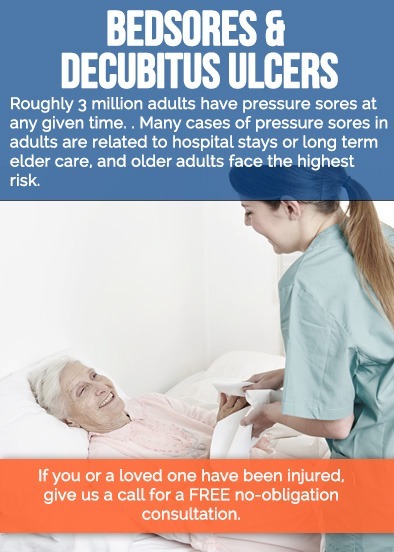 Seniors with reduced mobility can often develop bedsores. Bedsores, technically known as pressure sores or decubitus ulcers, are caused by repeated pressure on the same areas of the skin.
Seniors with reduced mobility can often develop bedsores. Bedsores, technically known as pressure sores or decubitus ulcers, are caused by repeated pressure on the same areas of the skin.
They’re a risk for anyone who cannot stand or change positions regularly. And while all bedsores are irritating, bedsores that are left untreated can become life threatening.
Roughly 3 million adults have pressure sores at any given time. The majority of these cases are seen in people who are confined to bed, use a wheelchair, or have a medical condition that makes it hard to change posture.
Many cases of pressure sores in adults are related to hospital stays or long term elder care, and older adults face the highest risk.
In Georgia, pressure sores are one of the most common complaints we see with seniors in elder care facilities.
If you or a loved one have suffered an infection from pressure sores, or required surgery because your bedsores went undiagnosed, John Foy & Associates can help.
We are one of Georgia’s largest and most experienced law firms handling elder neglect cases. Call us at 404-400-4000 and get a free legal consultation.
How do Pressure Sores Form?
Pressure sores can form anytime there is repeated pressure on the same area of skin. However, they’re far more common in patients over the age of 70. This is partly because the skin becomes weaker as it ages, and partly because older adults tend to be less mobile. Anytime someone sits, reclines or lies in the same position day after day, there is a risk of pressure sores.
Some areas of the body face a higher risk than others. Often, pressure sores form where a bony area presses against a chair, bed or cushion. The hard bony area puts added pressure on the skin over it, increasing the chance of sores.
The most common area for pressure sores is around the pelvis. An estimated 75% of all pressure sores form over the bones of the “pelvic girdle,” including the hips, thighs and lower back/sacrum.
Pressure sores don’t always form from sitting or lying down, however. Any source of constant pressure can cause them. It’s not uncommon for pressure sores to form underneath casts, splints or cervical collars. Even tight clothing can lead to pressure sores over time.
Get the strong arm
How Bad Are Pressure Sores for the Elderly?
Pressure sores are serious if they’re allowed to go untreated. The sores start off mild and become dangerous over time. Accordingly, pressure sores are classed into four main categories: Stages I, II, III and IV. It does not take long for pressure sores to progress from Stage I to Stage IV—that’s why it’s imperative that a nursing home checks every resident for sores every day.
Stage I and II pressure sores are considered relatively minor. With proper care and a change in position, they can fully heal within a few weeks.
Pressure sores that reach stage III and IV become serious. At this point, some of the tissue has actually died and the bedsore can become infected. Some sores at this stage will develop life threatening conditions such as gangrene or blood poisoning. Both of these conditions can be fatal. Other possible complications of an unchecked bedsore include joint infections and even cancer.
Bedsores should never be allowed to progress to Stage III or beyond. All elder care facilities should have practices in place to spot and prevent bedsores before they become serious.
How Are Pressure Sores Treated?
The best way to treat pressure sores is to prevent them from happening in the first place. Elder care staff should check for pressure sores regularly while bathing a resident or changing their bed pan. Early stage bedsores can be treated with basic wound care.
The sores must be kept clean and covered with dressing (with the dressing changed on a regular basis). Treatment also means repositioning the patient so that they don’t keep putting pressure on the same areas. Special cushioning known as support surfaces can help.
At Stage III and beyond, treatment becomes more invasive. At this point the wound will require debridement. Debridement is the removal of dead or infected tissue, usually done surgically. In some cases the entire sore must be removed and replaced with a “pad” of healthy skin or muscle from elsewhere on the body.
If the bedsore has had complications, those complications will need treatment in their own right. For example, when carcinoma (cancer) forms from an untreated bed sore, it requires surgery and other treatment.
If the bed sore leads to gangrene, an aggressive intervention will be needed which may include amputation. The earlier a pressure sore is diagnosed, the easier it is to treat.
Are Nursing Homes Liable for Pressure Sores?
Yes, in many cases the nursing home bears liability for an infected pressure sore. A nursing home has a duty to provide competent, attentive care to their residents. Noticing bedsores is a basic part of that care.
Your elder care provider may be liable for a pressure sore it:
- They didn’t notice the bedsore, or they noticed it but didn’t diagnose it. Pressure sores are so common with elderly patients that all elder care staff should be vigilant.
- They diagnosed it but thought it wasn’t serious. For example, if staff spotted a Stage III bedsore and misdiagnosed it as a less serious Stage II sore.
- They didn’t treat the bedsore or did not use the correct, recommended treatment.
- They did not modify the patient’s treatment plan based on the sores. This is a tragically common problem. Simply cleaning and dressing a pressure sore is meaningless if the underlying cause of the sore is not addressed.
In all of these cases, staff failed in their duty to your loved one. Their negligence is what led to any complications with the sore. They are legally liable for those complications.
How Can a Georgia Elder Neglect Lawyer Help?
An out of control pressure sore can have serious consequences. It can lead to pain, anguish, serious medical conditions and mounting medical bills. In some cases it can leave a patient with lifelong complications, or even claim a life. Nothing is more tragic than seeing a tiny, easily treated sore become life threatening.
If this has happened to someone you love, please know that you have options. You should speak to an experienced Atlanta nursing home abuse lawyer. You may be able to recover all of the money you need for medical bills and related expenses. You can also make sure that those who neglected your loved one will be held accountable.
John Foy has dedicated his life to helping families and individuals in Georgia. He believes in helping the people who have been wronged by elder care neglect. John Foy & Associates offer a free consultation to discuss your case. We will come to your home, office or wherever is convenient and help you understand your options. And if we can’t get you a financial recovery, we charge you nothing.
Don’t wait until it’s too late. Call 404-400-4000 and get your FREE consultation today.
(404) 400-4000 or complete a Free Case Evaluation form




